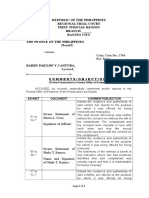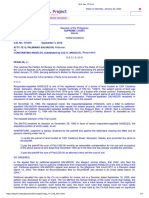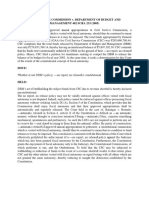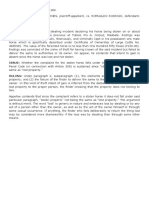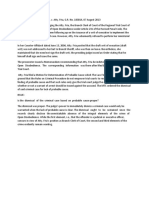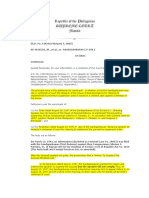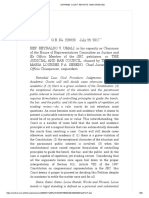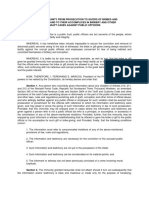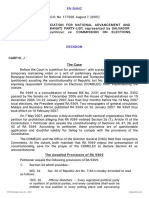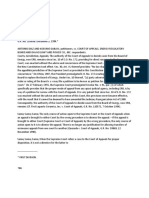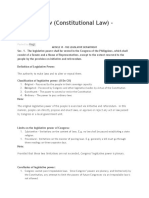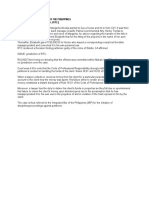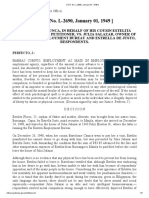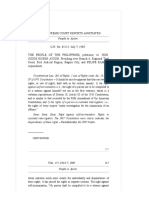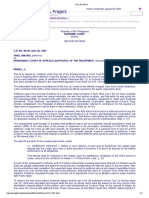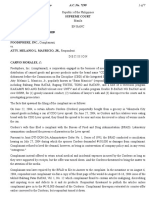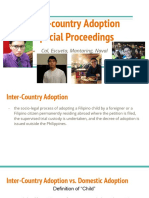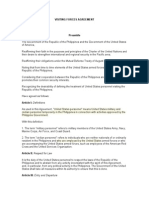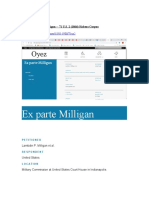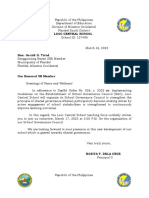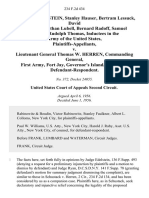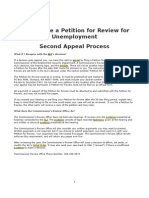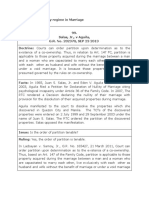0 ratings0% found this document useful (0 votes)
33 viewsGalicto v. Aquino
Galicto v. Aquino
Uploaded by
Lourd Mantaring1) President Aquino issued Executive Order 7 in response to reports of excessive salaries and benefits of government owned corporation directors and trustees.
2) The order suspended allowances and bonuses of directors and trustees until December 31, 2010 and established guidelines for rationalizing compensation in government corporations.
3) The petition for certiorari and prohibition against the order was deemed an incorrect remedy since the issuance of an executive order is not a judicial act. Instead, a petition for declaratory relief would be the proper method to challenge the order's validity.
Copyright:
© All Rights Reserved
Available Formats
Download as DOCX, PDF, TXT or read online from Scribd
Galicto v. Aquino
Galicto v. Aquino
Uploaded by
Lourd Mantaring0 ratings0% found this document useful (0 votes)
33 views1 page1) President Aquino issued Executive Order 7 in response to reports of excessive salaries and benefits of government owned corporation directors and trustees.
2) The order suspended allowances and bonuses of directors and trustees until December 31, 2010 and established guidelines for rationalizing compensation in government corporations.
3) The petition for certiorari and prohibition against the order was deemed an incorrect remedy since the issuance of an executive order is not a judicial act. Instead, a petition for declaratory relief would be the proper method to challenge the order's validity.
Original Title
Galicto v. Aquino.docx
Copyright
© © All Rights Reserved
Available Formats
DOCX, PDF, TXT or read online from Scribd
Share this document
Did you find this document useful?
Is this content inappropriate?
1) President Aquino issued Executive Order 7 in response to reports of excessive salaries and benefits of government owned corporation directors and trustees.
2) The order suspended allowances and bonuses of directors and trustees until December 31, 2010 and established guidelines for rationalizing compensation in government corporations.
3) The petition for certiorari and prohibition against the order was deemed an incorrect remedy since the issuance of an executive order is not a judicial act. Instead, a petition for declaratory relief would be the proper method to challenge the order's validity.
Copyright:
© All Rights Reserved
Available Formats
Download as DOCX, PDF, TXT or read online from Scribd
Download as docx, pdf, or txt
0 ratings0% found this document useful (0 votes)
33 views1 pageGalicto v. Aquino
Galicto v. Aquino
Uploaded by
Lourd Mantaring1) President Aquino issued Executive Order 7 in response to reports of excessive salaries and benefits of government owned corporation directors and trustees.
2) The order suspended allowances and bonuses of directors and trustees until December 31, 2010 and established guidelines for rationalizing compensation in government corporations.
3) The petition for certiorari and prohibition against the order was deemed an incorrect remedy since the issuance of an executive order is not a judicial act. Instead, a petition for declaratory relief would be the proper method to challenge the order's validity.
Copyright:
© All Rights Reserved
Available Formats
Download as DOCX, PDF, TXT or read online from Scribd
Download as docx, pdf, or txt
You are on page 1of 1
Title: Galicto v.
Aquino and incentives of members of the Board of
Doctrine: Directors/Trustees until December 31, 2010
Since the issuance of an EO is not judicial, quasi-judicial or a Petition for Certiorari and Prohibition with Application for
mandatory act, a petition for certiorari and prohibition is an Writ of Preliminary Injunction and/or Temporary
incorrect remedy Restraining Order, seeking to nullify and enjoin the
Facts: implementation of Executive Order No. (EO) 7 issued by the
Pres. Aquino made public in his first State of the Nation Office of the President
Address the alleged excessive allowances, bonuses and
other benefits of Officers and Members of the Board of Issue:
Directors of the Manila Waterworks and Sewerage System a WON the petition will prosper – NO
government owned and controlled corporation (GOCC)
which has been unable to meet its standing obligations. Held:
Subsequently, the Senate of the Philippines (Senate), Under the Rules of Court, petitions for Certiorari and
through the Senate Committee on Government Prohibition are availed of to question judicial, quasi-judicial
Corporations and Public Enterprises, conducted an inquiry and mandatory acts. Since the issuance of an EO is not
in aid of legislation on the reported excessive salaries, judicial, quasi-judicial or a mandatory act, a petition for
allowances, and other benefits of GOCCs and government certiorari and prohibition is an incorrect remedy; instead a
financial institutions (GFIs) petition for declaratory relief under Rule 63 of the Rules of
Senate issued Senate Resolution No. 17 urging the President Court, filed with the Regional Trial Court (RTC), is the proper
to order the immediate suspension of the unusually large recourse to assail the validity of EO 7.
and apparently excessive allowances, bonuses, incentives Because of the transitory nature of EO 7, it has been
and other perks of members of the governing boards of pointed out that the present case has already been
[GOCCs] and [GFIs]. rendered moot by these supervening events: (1) the lapse
Heeding the call of Congress, Pres. Aquino issued EO 7, on December 31, 2010 of Section 10 of EO 7 that suspended
entitled Directing the Rationalization of the Compensation the allowances and bonuses of the directors and trustees of
and Position Classification System in the [GOCCs] and [GFIs], GOCCs and GFIs; and (2) the enactment of R.A. No. 10149
and for Other Purposes. EO 7 provided for the guiding amending the provisions in the charters of GOCCs and GFIs
principles and framework to establish a fixed compensation empowering their board of directors/trustees to determine
and position classification system for GOCCs and GFIs. their own compensation system, in favor of the grant of
Finally, EO 7 ordered (1) a moratorium on the increases in authority to the President to perform this act.
the salaries and other forms of compensation, except
salary adjustments under EO 8011 and EO 900, of all GOCC
and GFI employees for an indefinite period to be set by the
President, and (2) a suspension of all allowances, bonuses
You might also like
- Sample Comment On Formal Offer of EvidenceDocument3 pagesSample Comment On Formal Offer of EvidenceZoroaster Guitelen Bolinget100% (2)
- Galicto v. Aquino (2012)Document10 pagesGalicto v. Aquino (2012)delayinggratificationNo ratings yet
- Board of Regents of MSU v. Osop, G.R. No. 172448, February 22, 2012Document3 pagesBoard of Regents of MSU v. Osop, G.R. No. 172448, February 22, 2012Caleb Josh PacanaNo ratings yet
- Atty. Fe Q. Palmiano-Salvador, Petitioner, vs. Constantino Angeles, Substituted by Luz G. Angeles, Respondent.Document3 pagesAtty. Fe Q. Palmiano-Salvador, Petitioner, vs. Constantino Angeles, Substituted by Luz G. Angeles, Respondent.engrgigikayeNo ratings yet
- Bacani VS NacocoDocument8 pagesBacani VS NacocoMon NhetteNo ratings yet
- 13.5 Escalona v. Padillo, AM P-10-2785, September 21, 2010Document1 page13.5 Escalona v. Padillo, AM P-10-2785, September 21, 2010TricksterNo ratings yet
- Alimpoos Vs CA (Macacua) - RevisedDocument1 pageAlimpoos Vs CA (Macacua) - RevisedAlvia Aisa MacacuaNo ratings yet
- ARTICLE 14 - Aggravating CircumstancesDocument21 pagesARTICLE 14 - Aggravating CircumstancesImee CallaoNo ratings yet
- By Red: 2. People of The Philippines Vs Edgardo Odtuhan GR. No. 191566 Jul 17, 2013Document1 pageBy Red: 2. People of The Philippines Vs Edgardo Odtuhan GR. No. 191566 Jul 17, 2013Kate MontenegroNo ratings yet
- Persons and Family Relations ReviewerDocument118 pagesPersons and Family Relations ReviewerANDRES, JR. TEODORONo ratings yet
- CSC Vs DOBMDocument1 pageCSC Vs DOBMBruce WayneNo ratings yet
- Formigones DoctrineDocument1 pageFormigones DoctrineJosh Saldo AzuelaNo ratings yet
- People Vs Rodrigo, GR No. L-18507, 31 March 1966Document1 pagePeople Vs Rodrigo, GR No. L-18507, 31 March 1966Monica FerilNo ratings yet
- 06.chavez Mendoza v. Fria, GR No. 183014, 07 August 2013Document1 page06.chavez Mendoza v. Fria, GR No. 183014, 07 August 2013Benedicto PintorNo ratings yet
- de Venecia JR., v. Sandiganbayan, G.R. No. 130240, February 5, 2002Document3 pagesde Venecia JR., v. Sandiganbayan, G.R. No. 130240, February 5, 2002Madara UchihaNo ratings yet
- Umali Vs Judicial & Bar Council, 832 SCRA 194, G.R. No. 228628, July 25, 2017Document99 pagesUmali Vs Judicial & Bar Council, 832 SCRA 194, G.R. No. 228628, July 25, 2017Gi NoNo ratings yet
- Legislative - Tolentino V Secretary of FinanceDocument3 pagesLegislative - Tolentino V Secretary of FinanceNathalie Faye Abad ViloriaNo ratings yet
- Republic v. Galang, G.R. No. 168335, June 6, 2011Document3 pagesRepublic v. Galang, G.R. No. 168335, June 6, 2011Amando III JayonaNo ratings yet
- Mississippi Ex Rel. Robertson v. Miller, 276 U.S. 174 (1928)Document4 pagesMississippi Ex Rel. Robertson v. Miller, 276 U.S. 174 (1928)Scribd Government DocsNo ratings yet
- PD 749Document2 pagesPD 749Samuel MontesaNo ratings yet
- Davao Sawmill Vs CastilloDocument3 pagesDavao Sawmill Vs CastilloNEWBIENo ratings yet
- Dabalos v. Judge Paras-QuiambaoDocument2 pagesDabalos v. Judge Paras-QuiambaoJan Alaba100% (1)
- January 2018 Crim Law 2 CasesDocument79 pagesJanuary 2018 Crim Law 2 CasesMaireen Jade NamoroNo ratings yet
- Pormento Vs EsteradaDocument21 pagesPormento Vs EsteradaAcad CARTCNo ratings yet
- LETTER OF ASSOCIATE JUSTICE REYNATO S. PUNO of The Court of Appeals Dated 14 November 1990.Document3 pagesLETTER OF ASSOCIATE JUSTICE REYNATO S. PUNO of The Court of Appeals Dated 14 November 1990.Almazan RockyNo ratings yet
- An Appeal by CertiorariDocument2 pagesAn Appeal by CertiorariAronJamesNo ratings yet
- BANAT v. COMELEC, G.R. No. 177508, August 7, 2009, 595 SCRA 477 PDFDocument13 pagesBANAT v. COMELEC, G.R. No. 177508, August 7, 2009, 595 SCRA 477 PDFanthony magandaNo ratings yet
- U.S. v. Tamparong, 31 Phil. 321 (1915)Document12 pagesU.S. v. Tamparong, 31 Phil. 321 (1915)Kristine JoyNo ratings yet
- Diaz vs. Court of Appeals, 238 SCRA 785, G.R. No. 109698 December 5, 1994 PDFDocument5 pagesDiaz vs. Court of Appeals, 238 SCRA 785, G.R. No. 109698 December 5, 1994 PDFMarl Dela ROsaNo ratings yet
- Poli Law ReviewerDocument5 pagesPoli Law ReviewerDenn Reed Baring Tuvera Jr.No ratings yet
- 7.people v. AlmendralDocument3 pages7.people v. AlmendralAlecsandra ChuNo ratings yet
- VOL. 331, APRIL 27, 2000 55: Calub vs. Court of AppealsDocument15 pagesVOL. 331, APRIL 27, 2000 55: Calub vs. Court of AppealsAira Mae P. LayloNo ratings yet
- Judicial Department (Article Viii) Traditional Concept of Judicial PowerDocument8 pagesJudicial Department (Article Viii) Traditional Concept of Judicial PowerEye CandiesNo ratings yet
- Political Law-Legislative NotesDocument16 pagesPolitical Law-Legislative NotesArchien CassionNo ratings yet
- Statcon CaseDocument18 pagesStatcon CaseGladys QuiatchonNo ratings yet
- 28 CREDTRANS Saludo Vs SCBDocument1 page28 CREDTRANS Saludo Vs SCBJimenez LorenzNo ratings yet
- A.M. No. MTJ-17-1889 (Formerly OCA IPI No. 16-2822-MTJ), September 03, 2019Document12 pagesA.M. No. MTJ-17-1889 (Formerly OCA IPI No. 16-2822-MTJ), September 03, 2019roshanNo ratings yet
- Landbank V CA 1996 (Agrarian Law)Document4 pagesLandbank V CA 1996 (Agrarian Law)Rynor Selyob SomarNo ratings yet
- BUENASEDA V FLAVIERDocument7 pagesBUENASEDA V FLAVIERTimothy JamesNo ratings yet
- CC03 Badillo v. Tayag, GR 143976Document8 pagesCC03 Badillo v. Tayag, GR 143976Jchelle DeligeroNo ratings yet
- Villa RazaDocument2 pagesVilla RazaAlexander Julio ValeraNo ratings yet
- Petitioners vs. vs. Respondents Martinez & Martinez Office of The Solicitor General, Dept of JusticeDocument7 pagesPetitioners vs. vs. Respondents Martinez & Martinez Office of The Solicitor General, Dept of Justicemmm businessNo ratings yet
- 3 Branches of GovtDocument25 pages3 Branches of GovtDona NofiesNo ratings yet
- Treñas Vs PeopleDocument1 pageTreñas Vs PeopleQQQQQQNo ratings yet
- Fenequito V. Vergara, JRDocument1 pageFenequito V. Vergara, JRalexis_beaNo ratings yet
- Caunca v. SalazarDocument3 pagesCaunca v. SalazarCases M7No ratings yet
- CD Lim v. PacquingDocument2 pagesCD Lim v. PacquingRon Jacob AlmaizNo ratings yet
- Statcon Cases DigestDocument7 pagesStatcon Cases DigestRaakista18 SWNo ratings yet
- Evangelista Vs JarencioDocument2 pagesEvangelista Vs JarencioElyn ApiadoNo ratings yet
- People vs. Ayson, 175 SCRA 216, July 07, 1989Document21 pagesPeople vs. Ayson, 175 SCRA 216, July 07, 1989TNVTRLNo ratings yet
- Jaylo Vs SandiganbayanDocument4 pagesJaylo Vs SandiganbayanKris Mee TrujilloNo ratings yet
- G.R. No. 96132Document4 pagesG.R. No. 96132Enrryson SebastianNo ratings yet
- 33-Foodshpere, Inc. v. Atty. Mauricio A.C. No. 7199 July 22, 2009Document7 pages33-Foodshpere, Inc. v. Atty. Mauricio A.C. No. 7199 July 22, 2009Jopan SJNo ratings yet
- Admin Law My Digest 10-04Document10 pagesAdmin Law My Digest 10-04KANo ratings yet
- People v. SandiganbayanDocument3 pagesPeople v. Sandiganbayanangelo6chingNo ratings yet
- Tañada V TuveraDocument6 pagesTañada V TuveraLawardCapsNo ratings yet
- Reodica v. CADocument2 pagesReodica v. CAAthina Maricar CabaseNo ratings yet
- 12 Lateo vs. PeopleDocument16 pages12 Lateo vs. PeopleMartin Tongco Fontanilla100% (1)
- Galicto v. Aquino (2012)Document7 pagesGalicto v. Aquino (2012)John OrdanezaNo ratings yet
- Galicto vs. Aquino IIIDocument2 pagesGalicto vs. Aquino IIISabrina PrepenaNo ratings yet
- Galicto V AquinoDocument3 pagesGalicto V AquinoEpibelle EderNo ratings yet
- GREPALIFE v. LeuterioDocument2 pagesGREPALIFE v. LeuterioLourd MantaringNo ratings yet
- Inter Country Adoption SPECPRO PDFDocument56 pagesInter Country Adoption SPECPRO PDFLourd MantaringNo ratings yet
- Montecillo v. SiaDocument2 pagesMontecillo v. SiaLourd MantaringNo ratings yet
- 1 North Sea Continental Shelf CasesDocument9 pages1 North Sea Continental Shelf CasesLourd MantaringNo ratings yet
- 10) Duran v. OlivaDocument2 pages10) Duran v. OlivaLourd MantaringNo ratings yet
- Visiting Forces AgreementDocument7 pagesVisiting Forces AgreementLourd MantaringNo ratings yet
- Chapter 6Document38 pagesChapter 6angeluNo ratings yet
- Sarbanes-Oxley ActDocument22 pagesSarbanes-Oxley ActJalpa PithavaNo ratings yet
- 1 Garcia vs. de Vera 418 SCRA 27Document18 pages1 Garcia vs. de Vera 418 SCRA 27RexNo ratings yet
- Amalgamation of Registered Trade Union: Procedure and EffectsDocument3 pagesAmalgamation of Registered Trade Union: Procedure and EffectsThaneshwar Jangid100% (1)
- Delayed JusticeDocument29 pagesDelayed JusticeVinay SahuNo ratings yet
- 19 - Soriano v. LaguardiaDocument8 pages19 - Soriano v. LaguardiaKarla Bee100% (1)
- Legarda v. SaleebyDocument16 pagesLegarda v. SaleebyAngelica Joyce BelenNo ratings yet
- Notes - RIGHT TO INFORMATIONDocument10 pagesNotes - RIGHT TO INFORMATIONG ThNo ratings yet
- Torts AdditionalDocument24 pagesTorts AdditionalMario O Malcolm100% (1)
- CASES Ex Parte Milligan - 71 U.S. 2 (1866) Habeas CorpusDocument195 pagesCASES Ex Parte Milligan - 71 U.S. 2 (1866) Habeas CorpusJo RoNo ratings yet
- Vera Vs AvelinoDocument1 pageVera Vs AvelinolckdsclNo ratings yet
- SGC LettersDocument14 pagesSGC LettersRhes Sy YuNo ratings yet
- Central University of South Bihar: Case-Study NHRC State of Arunachal Pradesh AIR 1996 SC 1234Document9 pagesCentral University of South Bihar: Case-Study NHRC State of Arunachal Pradesh AIR 1996 SC 1234VikasNo ratings yet
- United States Court of Appeals Second Circuit.: No. 372, Docket 24055Document2 pagesUnited States Court of Appeals Second Circuit.: No. 372, Docket 24055Scribd Government DocsNo ratings yet
- General Principles of International Law Recognised by Civilised StatesDocument6 pagesGeneral Principles of International Law Recognised by Civilised StatesNavdeep Birla100% (1)
- 4 Brand CommunicationsDocument18 pages4 Brand CommunicationsRIVALDI ADZANI GARNIANSYAH 24071120140No ratings yet
- G.R. No. 152459Document5 pagesG.R. No. 152459KcompacionNo ratings yet
- Citizen's Informer May - August 2014Document36 pagesCitizen's Informer May - August 2014henrywolffNo ratings yet
- Samar CP Deicision AffirmedDocument8 pagesSamar CP Deicision AffirmedvaleryannsNo ratings yet
- Kukan International - Case DigestDocument2 pagesKukan International - Case Digestanailabuca67% (3)
- The Indian Bar Councils Act, 1926Document9 pagesThe Indian Bar Councils Act, 1926mithun7No ratings yet
- The Zalkin Law Firm Secures Landmark Ruling in Title IX Sexual Assault Lawsuit Against University of California BerkeleyDocument3 pagesThe Zalkin Law Firm Secures Landmark Ruling in Title IX Sexual Assault Lawsuit Against University of California BerkeleyPR.comNo ratings yet
- Sample PFRDocument6 pagesSample PFRjessimarie12No ratings yet
- Property Regime in Marriage Case DigestDocument21 pagesProperty Regime in Marriage Case DigestJeremiah John Soriano NicolasNo ratings yet
- PACU v. Secretary of Education (G.R. No. L-5279)Document2 pagesPACU v. Secretary of Education (G.R. No. L-5279)aitoomuchtvNo ratings yet
- Luigi Feliciano (Curriculum Vitae)Document3 pagesLuigi Feliciano (Curriculum Vitae)Luigi FelicianoNo ratings yet
- Orianne Collins and Thomas Bates Response To Phil Collins ComplaintDocument25 pagesOrianne Collins and Thomas Bates Response To Phil Collins ComplaintPeterBurkeNo ratings yet
- Emergency Provisions Under The Indian ConstitutionDocument4 pagesEmergency Provisions Under The Indian ConstitutionShivangi BajpaiNo ratings yet
- FDA Statement To Ao-2010-0008Document1 pageFDA Statement To Ao-2010-0008Athena LouiseNo ratings yet
